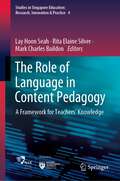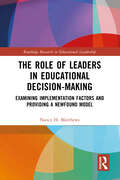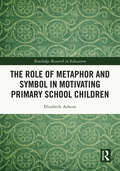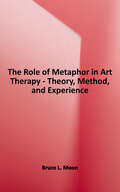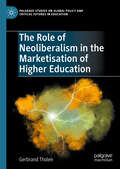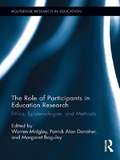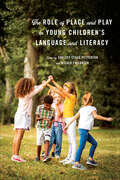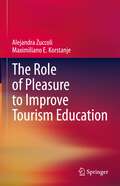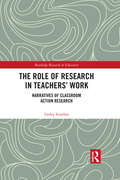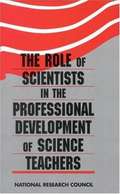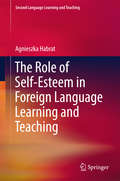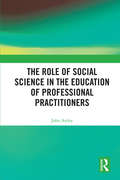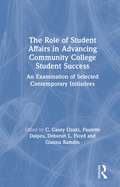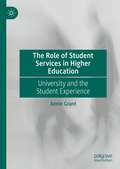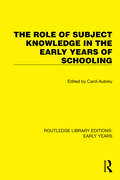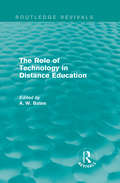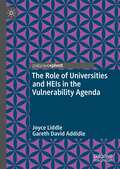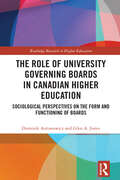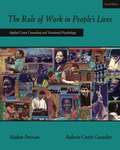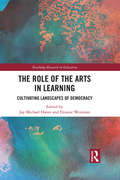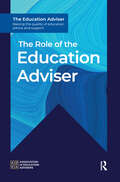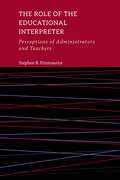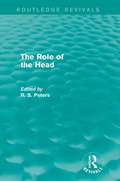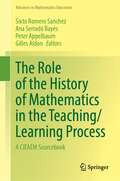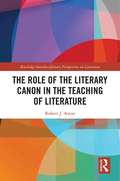- Table View
- List View
The Role of Language in Content Pedagogy: A Framework for Teachers’ Knowledge (Studies in Singapore Education: Research, Innovation & Practice #4)
by Rita Elaine Silver Lay Hoon Seah Mark Charles BaildonThis book explores the importance of language in content learning. It focuses on teachers’ roles, knowledge and understanding of language in school contexts (including academic language and disciplinary languages) to support students. It examines teachers' language-related knowledge base for content teaching, which include teachers' knowledge of and about language, knowledge of (their) students and their pedagogical knowledge. This book also explores how teachers’ knowledge of language, students and content are linked as part of a larger pedagogical content knowledge, which includes knowledge of the role of language in content learning. As well, it further considers literacy (and literacies) as part of this examination of teachers’ knowledge of language.
The Role of Leaders in Educational Decision-Making: Examining Implementation Factors and Providing a Newfound Model (Routledge Research in Educational Leadership)
by Nancy H. MatthewsThis book presents insights into the experiences and perspectives of educators in formal positions of leadership involved in decision-making processes in an education system. Drawing on qualitative research conducted in the New Brunswick education system, the author identifies factors in the decision-making process which influence whether or not a decision is implemented. Probing what is required for effective decision-making, defined as decision-making that results in implementation, the book examines not only the role of formal educational leaders of schools (administrators) but also the roles played by district and department of education formal leaders. It uses five central themes that surfaced from research to develop a novel leadership model for ensuring implantation of decisions. These include knowledge and skill; collaboration and communication; balance of autonomy, accountability, and direction; political and bureaucratic considerations; and strong moral imperative. The newfound model is presented in the form of antecedent steps to the decision-making process. Extending the literature by offering new, empirically grounded insights for influencing the likelihood of implementation following a decision-making process, it will appeal to leaders, scholars, and students of educational leadership and reform.
The Role of Metaphor and Symbol in Motivating Primary School Children (Routledge Research in Education)
by Elizabeth AshtonThis book provides a fresh approach to motivation in primary school children by exploring the role of metaphor and symbol in language and art as a means of expressing insights developed through learning. The book investigates and transcends Piaget’s dominant child developmental theories and considers alternative theories from psychiatry, not least ideas drawn from the theories of Jung and the works of McGilchrist. Using literary examples from primary school children’s work, including prose and poetry, religious narratives, and drama and art based on Jungian archetypal images, the book analyses how creative approaches to lesson planning around metaphor and symbol enable children to achieve higher levels of understanding than had been previously thought possible. Ultimately, the volume evaluates why current practice largely fails to retain the initial enthusiasm shown for learning by young children, and instead offers a wealth of possible new foundations and insights for learning among primary school children. Focusing the primary school curriculum on creative ability, this book will be of great interest to academics, researchers, and post-graduate students in the fields of educational psychology, primary school education and educational theory.
The Role of Metaphor in Art Therapy: Theory, Method, and Experience
by Bruce L. MoonPragmatic and poetic, this book is a tribute to the complexities and mysteries of working with people who are suffering and striving to tell their stories through expressive artistic processes. Its roots lay deep in encounters with children, adolescents, and adults who have come to the author for help over the last three decades. It is grounded in interactions with graduate art therapy students and encounters with important themes in life. This book makes no effort to affix particular meanings to the metaphors discussed in the clinical vignettes, but rather, suggests ways to listen and respond to metaphoric communications. In the methodology described in this book, ways to respond to clients’ metaphors are demonstrated by creating stories, poems, and visual artworks. Art therapy sessions are described, engaging in dialogues with clients and their artworks in an effort to invite both to share stories. The studio-based approach, where artists and art therapists work side-by-side making art, exploring transition issues, and listening metaphorically, is examined. In addition, the relevance of esthetics and empathy in looking at client artwork without judgment and responding to the client through art making is discussed. This excellent resource describes how to look at, listen to, and respond to the metaphors that artworks divulge.
The Role of Neoliberalism in the Marketisation of Higher Education (Palgrave Studies on Global Policy and Critical Futures in Education)
by Gerbrand TholenThis book assesses to what extent marketisation in Higher Education can be attributed to Neoliberalism. Higher education sectors in many countries have increasingly relied on market mechanisms in their management and functioning, particularly in their provision of education. Many assume that Neoliberalism, with its pursuit of free markets and competition, is the key driver. Neoliberalism continues to be a popular concept to describe the social, political, and economic worlds around us, but there is little consensus on how it should be defined or understood. The book argues that there is a clear scope for the use of Neoliberalism to describe the direction HE is shifting towards, but it is rather inadequate on its own and not applicable in all areas.
The Role of Participants in Education Research: Ethics, Epistemologies, and Methods (Routledge Research in Education #87)
by Margaret Baguley Patrick Alan Danaher Warren MidgleyThis book explores different perspectives on the role, influence and importance of participants in education research. Drawing on a variety of philosophical, theoretical and methodological approaches, the book examines how researchers relate to and with their participants before, during, and after the collection and/or production of data; reimagining the rights of participants, the role/s of participants, the concept/s of "participant" itself.
The Role of Place and Play in Young Children’s Language and Literacy
by Shelley Stagg Peterson Nicola FriedrichDominant assumptions about place tend to be defined in relation to urban communities. To assume a singular construction of urban places misrepresents the experiences, perspectives, and identities of urban children, making their identities become invisible to researchers, educators, and curriculum developers. Sharing a wide range of perspectives, Role of Play and Place in Young Children’s Language and Literacy sheds light on language and literacy learning in play-based early childhood settings where place plays an important role in teaching and learning. Drawing on geographic contexts, including northern rural and Indigenous communities, and giving voice to educational leaders in Indigenous professional learning contexts, as well as speech-language pathologists, this book joins forces with literacy and early childhood education researchers to create an interdisciplinary collage of theory, research, and practice. Bringing play and place together, a concept Shelley Stagg Peterson and Nicola Friedrich call playce-based learning, this book provides new and compelling ways to think about equity and educational opportunity in the language and literacy development of young children, and offers spaces for them to construct their own identities in positive ways.
The Role of Pleasure to Improve Tourism Education
by Maximiliano E. Korstanje Alejandra ZuccoliThis book discusses how pleasure, as an emotional motivation, can play a leading role in improving the learning of new cognitive skills and abilities. Set in a research center orientated to innovate educative techniques for optimizing the learning process, this case study is focusing on the power of pleasure (joy) as a strategy to better the standard education systems in Argentina and beyond.This editorial project is based on an efficient experiment known as “PANCOE” where pre-graduate students of tourism bachelor at the University of Palermo, Argentina, were subject to different pleasurable experiences mainly marked by eating, tasting dishes and non-alcohol drinks while cooking and kneading bread pieces. PANCOE aims to integrate students' senses with their emotions, academic performance, and digital platforms. PANCOE devotes efforts to transforming negative feelings like fear into positive ones like joy. As an outcome, students who had taken part in PANCOE not only obtained higher degrees but also completed their studies with a bachelor's degree. Therefore, PANCOE situates as a promising and exciting tourism education method to better the academic performance of low-grade students in tourism and to bring creativity to the tourism classroom for all students.
The Role of Research in Teachers' Work: Narratives of Classroom Action Research (Routledge Research in Education)
by Lesley ScanlonIn the debate regarding what constitutes teachers’ work, academics and bureaucrats continue to speak for teachers, with teachers’ voices rarely heard and not accorded equal recognition. The Role of Research in Teachers’ Work addresses this imbalance by privileging teachers’ voices as they narrate their experiences of engaging in systematic inquiry. The book embeds the teacher narratives within the scholarly debates about the nature of knowledge and the nature of professional practice. Scanlon examines the knowledge teachers create through their research and how that knowledge is perceived by others within the school community. This book can be read as a companion volume to Scanlon’s 2015 Routledge publication My School, or as a standalone exploration of teachers’ own narratives of engaging in action research. Together, these two books are unique in contemporary writing on schools, representing one of the only comprehensive longitudinal studies of a low socioeconomic secondary school from the perspective of those who learn and teach therein. This book enables teachers to be part of the scholarly conversation about their work and the place of research in that work. As such, it should be essential reading for academics, teacher educators and postgraduates in the field of education. It should also be of interest to policymakers and teachers.
The Role of Scientists in the Professional Development of Science Teachers
by Committee on Biology Teacher Inservice ProgramsScientists nationwide are showing greater interest in contributing to the reform of science education, yet many do not know how to begin.This highly readable book serves as a guide for those scientists interested in working on the professional development of K-12 science teachers. Based on information from over 180 professional development programs for science teachers, the volume addresses what kinds of activities work and why. Included are useful examples of programs focusing on issues of content and process in science teaching.The authors present "day-in-a-life" vignettes, along with a suggested reading list, to help familiarize scientists with the professional lives of K-12 science teachers. The book also offers scientists suggestions on how to take first steps toward involvement, how to identify programs that have been determined effective by teachers, and how to become involved in system-wide programs. Discussions on ways of working with teachers on program design, program evaluation, and funding sources are included.Accessible and practical, this book will be a welcome resource for university, institutional, and corporate scientists; teachers; teacher educators; organizations; administrators; and parents.
The Role of Self-Esteem in Foreign Language Learning and Teaching (Second Language Learning and Teaching)
by Agnieszka HabratThis book demonstrates how foreign language self-esteem (FLSE) affects foreign language (L2) learning and teaching, and how it fluctuates with growing proficiency. Further, it explains the interaction between FLSE and a range of factors of recognized importance in second language acquisition (SLA). The theoretical part of the book presents the main pillars of self-esteem as well as its notable influence on psychological functioning and learning, with special emphasis being placed on L2 learning. In turn, the empirical part presents the findings of a study that explored the trajectory and behavioural outcomes of FLSE across three stages of education. The book closes by outlining future research directions, as well as some pedagogical implications. In particular, the findings of the study can be employed in teaching English as a foreign or second language by helping instructors understand the significance of learners’ individual differences.
The Role of Social Science in the Education of Professional Practitioners
by John AstleyThe Role of Social Science in the Education of Professional Practitioners explores the inter-relation between the social sciences and professional practice, particularly in areas of health and social welfare, and the form that professional education takes. The key issue of who provides for our health and welfare needs in the community is considered, as are the values and education that drive those people to give service in society, and how those professionals can come to a full and open understanding of their role. It focuses on the value orientation, identity development and sense of self that will enable practitioners to develop their understanding of clients’ needs in the community. The book is divided into chapters that consider the educational and learning theories that underpin professional education, and how those ideas have shaped the development of the curriculum for professional practice education. Astley provides an in-depth discussion of the nature of professional roles, and how the making and taking of those roles is historically influenced by politics and policy making. The nature and dynamics of the communities in which we live, including who has power, is addressed, with special reference to how the health and social welfare needs of citizens in those communities is assessed, planned for, and provided. This book will be vital reading for academics and professionals in the fields of health and social care professions’ education, social and behavioural sciences, higher education, professional development and identity formation.
The Role of Student Affairs in Advancing Community College Student Success: An Examination of Selected Contemporary Initiatives
by C. Casey Ozaki Paulette Dalpes Deborah Floyd Gianna RamdinThis collection brings together insightful chapters which explore diverse student success initiatives and programs in response to challenges faced by community colleges. Each chapter of the collection magnifies a specific aspect of student affairs to illustrate how dedicated departments and practitioners have effectively supported student success via select projects or initiatives. Readers will gain a deeper insight into the contemporary applications, practices, and impacts of agendas such as the assessment of student affairs and services, student success programming, Guided Pathways, and The Completion Agenda. By demonstrating the meaningful involvement of student affairs practitioners in fulfilling institutional missions and visions, this collection contributes to an overarching dialogue about promoting community college student success. This collection will be of interest to researchers, academics, graduates, and postgraduate students in the fields of higher education administration, educational leadership, adult education, and lifelong learning.
The Role of Student Services in Higher Education: University and the Student Experience
by Annie Grant“Renowned as a leading practitioner and voice of wisdom and reason, Annie Grant now shares her insight with those who are still on their professional journey within the higher education student experiential services through her writing. I commend this book to everyone who works in, or wants to really understand, the world of higher education in the UK today.”—Jayne Aldridge, Chairperson of AMOSSHE, The Student Services Organisation 2017-2021, and Director for the Student Experience, University of Sussex, UKThis book examines the aspirations, challenges and experiences of contemporary university students through the eyes and ears of those who provide professional advisory services. Providing an overview of the growth of the UK higher education sector in general and that of student advisory provision in particular, the author highlights the breadth and depth of the role that professional advisory staff now play in the higher education landscape. The volume addresses student academic and career success and their wellbeing, stressing the importance of understanding and respecting the diversity of the student body. In doing so, it emphasises the value of envisioning universities as inclusive and safe communities that challenge discrimination, prejudice and bullying, and the importance of proactive initiatives that help students to develop self-confidence and resilience. The author addresses other important but less frequently discussed matters, such as the impact of the marketization of higher education, alcohol and drug abuse and the ethical and moral values of higher education.
The Role of Subject Knowledge in the Early Years of Schooling (Routledge Library Editions: Early Years)
by Carol AubreyOriginally published in 1994, the aim of the authors was to provide a comprehensive introduction to recent advances in research which had been made in learning and teaching in the early years of schooling at the time. Emphasis is placed on how subject knowledge is constructed or acquired, and the organization of teaching to promote the learner’s active construction of meaning through the integration of new knowledge with existing understanding. The National Curriculum is founded in subject knowledge, though little examination appears to have been made of this in terms of how subject matter is transformed into the content of teaching that young children can understand. It this remains for the teacher to develop instruction through the creation of a curriculum content and sequence which both reflects and advances the structure of existing forms of representation, problem-solving and knowledge which the child brings to the school. The whole thrust of the book challenges the conventional early years ideology with its emphasis on child-centred, concrete and empirical approaches to learning, with a view of teaching which is concerned with making sense of children’s understanding, and allowing their active construction of knowledge and information-processing to develop expertise in context.
The Role of Technology in Distance Education (Routledge Revivals)
by Tony BatesThis book, first published in 1984, provides a comprehensive review of the range of technology that was being used in distance education. Technological developments in word processing, video-disc and viewdata as well as computer-based learning had revolutionised the potential for distance education. These developments required the role of more ’conventional’ distance learning media, such as broadcasting, tuition and text, to be reassessed. This book, written by international experts in the field, explored the state of the art at the time, and also provided their ideas on how future developments were likely to evolve. This book is ideal for those studying education and communications.
The Role of Universities and HEIs in the Vulnerability Agenda (Rethinking University-Community Policy Connections)
by Joyce Liddle Gareth David AddidleThis book re-assesses the societal and pastoral roles of Higher Education Institutions (HEIs) in order to consider the function that they have in engaging, or responding, to the Vulnerability Agenda. HEIs are increasingly focused on the inclusion of socially deprived individuals on programmes; but also disability assessments; mental health concerns; learning support plans and readiness for employment.Particularly in the midst of the COVID-19 pandemic, universities are being profoundly affected and transformed as steps are taken to modify existing approaches to teaching and learning. Universities have always had an implicit ‘duty of care’ for their stakeholders, but COVID-19 has brought into sharp focus the need for a more explicit demonstration that University leaders have the social awareness to recognize the importance of protecting and safeguarding the vulnerable in society.Arguing that HEIs have a significant role to play as a central ‘anchor’ agency in the safeguarding of vulnerable individuals, this book fills in gaps in theoretical, empirical and policy/practice understandings. It explores the changing civic and societal (pastoral) role that HEIs have developed in response to the increasingly important policy area surrounding vulnerability.
The Role of University Governing Boards in Canadian Higher Education: Sociological Perspectives on the Form and Functioning of Boards (Routledge Research in Higher Education)
by Glen A. Jones Dominik AntonowiczThis book explores the historical and social foundations of Canadian higher education and provides a detailed analysis of university boards within this broader context of university governance. By examining rich empirical data from a sociological perspective, it offers unique insights into the role of boards, and the structures and practices that frame their work. It explores board composition, the professional backgrounds of board members, how members perceive their role, and the complex relationships between the board and the university president. The authors also compare and contrast the Canadian experience with governance reforms in Europe and other regions over recent decades. Drawing on multiple theoretical perspectives, the authors provide a nuanced analysis of the role of boards in terms of oversight, protecting university autonomy, representing societal interests, and dealing with increasing complexity and expectations. This innovative, original study makes an enormous contribution to our understanding of the role and work of Canadian university boards, and to international scholarship on higher education governance. It will appeal to scholars and researchers with interests across higher education, international and comparative education, and the sociology of education.
The Role of Work in People's Lives: Applied Career Counseling and Vocational Psychology (2nd edition)
by Nadene Peterson Roberto Cortéz GonzálezThis text for future vocational psychologists and career counselors not only surveys theories, practices and the counselor's role in career development, it also calls for the transformation of the field to keep current with the changing place of work in people's lives. González (U. of Texas, El Paso) and Peterson (Our Lady of the Lake U. ) emphasize multiculturalism and diversity throughout the volume as they discuss the influence of the global economy and the corporate climate on work. Case studies and practical applications are interpolated in the discussions. Important terms are highlighted and defined in the appended glossary.
The Role of the Arts in Learning: Cultivating Landscapes of Democracy (Routledge Research in Education #22)
by Jay Michael Hanes Eleanor WeismanGrounded in philosophy from John Dewey and Maxine Greene, this book sheds light on difficulties and practicalities of examining culture and politics within the realm of interdisciplinary education. Providing both theoretical and concrete examples of the importance of a contemporary arts education, this book offers imaginative ways the arts and sciences intersect with democratic learning and civic engagement. Chapters focus on education in relation to diversity, apprenticeship, and civic engagement; neuroscience and cognition; urban aesthetic experience and learning; and science and art intelligence.
The Role of the Education Adviser (The Education Adviser)
by Association of Education AdvisersPerfect for new or prospective education advisers, this book gives you the foundation knowledge you need to explore the purpose, responsibilities and importance of the education adviser role. Part of The Education Adviser series, and fully aligned with the AoEA accreditation and development programme, it is divided into two main parts:the first section is made up of 'thought pieces' and the second illustrates examples of the adviser 'in action'.It provides essential and thought-provoking background reading for all those involved in advising in the education system with a wide variety of examples of good practice and different approaches to key educational issues. Content includes topics such as the attributes and skills of the Education Adviser, how to implement change, partnership working with schools, creating an inclusive culture, transforming schools, and enabling organisational change and improvement in organisations.
The Role of the Educational Interpreter: Perceptions of Administrators and Teachers (The Interpreter Education Series #11)
by Stephen B. FitzmauriceWhile educational interpreting has been studied for decades, the research has historically focused on the tasks educational interpreters are engaged in during their work day. In The Role of the Educational Interpreter, Stephen B. Fitzmaurice takes a new approach using role theory to examine how administrators and teachers perceive the role and work of educational (K–12) interpreters. Through a series of qualitative interviews and quantitative questionnaires with district administrators, school administrators, general education teachers, and teachers of the deaf, Fitzmaurice documents their perceptions of educational interpreters. Findings from the data reveal the perceptions of administrators and teachers set the stage for role ambiguity, role conflicts, and subsequent role overload for educational interpreters. Fitzmaurice elaborates on the implications of the research, and also provides concrete recommendations for researchers and practitioners, including an emphasis on the importance of involving the Deaf community in this work. This volume aims to offer clarity on the role of the educational interpreter, and dispel the confusion and conflicts created by divergent perspectives. A shared understanding of the role of the educational interpreter will allow administrators, teachers, and interpreters to work collaboratively to improve educational outcomes for deaf students.
The Role of the Head (Routledge Revivals: R. S. Peters on Education and Ethics)
by R. S. PetersFirst published in 1967, this book looks at what the role of a headteacher should be, challenging the traditional views of the head and the authoritarian structure of schools. Contributors explore new concepts of the head’s role in school and authors include both theorists and headteachers coming from various backgrounds including those that are historical, philosophical, sociological, and practical. The book also benefits from some more down-to-earth musings by heads on the job. The collection as a whole offers a stimulating variety of views on a subject which is of importance to all teachers, as well as those concerned with management and decision making. Although first published some time ago, it explores issues that are ever present today.
The Role of the History of Mathematics in the Teaching/Learning Process: A CIEAEM Sourcebook (Advances in Mathematics Education)
by Gilles Aldon Peter Appelbaum Sixto Romero Sanchez Ana Serradó BayésThis volume presents multiple perspectives on the uses of the history of mathematics for teaching and learning, including the value of historical topics in challenging mathematics tasks, for provoking teachers’ reflection on the nature of mathematics, curriculum development questions that mirror earlier pedagogical choices in the history of mathematics education, and the history of technological innovations in the teaching and learning of mathematics. An ethnomathematical perspective on the history of mathematics challenges readers to appreciate the role of mathematics in perpetuating consequences of colonialism. Histories of the textbook and its uses offer interesting insights into how technology has changed the fundamental role of curriculum materials and classroom pedagogies. History is explored as a source for the training of teachers, for good puzzles and problems, and for a broad understanding of mathematics education policy. Third in a series of sourcebooks from the International Commission for the Study and Improvement of Mathematics Teaching, this collection of cutting-edge research, stories from the field, and policy implications is a contemporary and global perspective on current possibilities for the history of mathematics for mathematics education. This latest volume integrates discussions regarding history of mathematics, history of mathematics education and history of technology for education that have taken place at the Commission's recent annual conferences.
The Role of the Literary Canon in the Teaching of Literature (Routledge Interdisciplinary Perspectives on Literature)
by Robert AstonThis book investigates the role of the idea of the literary canon in the teaching of literature, especially in colleges and secondary schools in the United States. Before the term "canon" was widely used in literary studies, which occurred in the second half of 20th century when the canon was first seriously viewed as politically and culturally problematic, the idea that some literary texts were more worthy of being studied than others existed since the beginning of the discipline of the teaching of literature in the 1800s. The concept of the canon, however, extends as far back as to Ancient Greece and its meaning has evolved over time. Thus, this book charts the changing meaning of the idea of the literary canon, examining its influence specifically in the teaching of literature from the beginning of the field to the 21st century. To explain how the literary canon and the teaching of literature have changed over time and continue to change, this book constructs a theory of canon formation based on the ideas of Michel Foucault and the assemblage theory of Manuel DeLanda, illustrating that the literary canon, while frequently contested, is integral to the teaching of literature yet changes as the teaching of literature changes.
